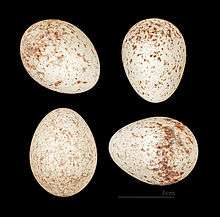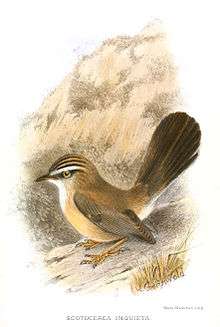Streaked scrub warbler
| Streaked scrub warbler | |
|---|---|
 | |
| Scientific classification | |
| Kingdom: | Animalia |
| Phylum: | Chordata |
| Class: | Aves |
| Order: | Passeriformes |
| Suborder: | Oscines |
| Superfamily: | Sylvioidea |
| Family: | Scotocercidae Fregin, Haase, Olsson & Alström, 2012 |
| Genus: | Scotocerca Sundevall, 1872 |
| Species: | S. inquieta |
| Binomial name | |
| Scotocerca inquieta (Cretzschmar, 1827)[2] | |

The streaked scrub warbler (Scotocerca inquieta) is a species of bird in the Scotocercidae family from Africa and south-western Asia. It is a bird of desert fringes, frequenting scrubby areas, ravines and gorges, and is mainly resident, although local movements can occur outside the breeding season.[3]
Description
The streaked scrub warler is a small, skulking desert warbler which cocks its tail over its back. The adults are grey brown above, finely streaked wuth dark brown. They have a broad pale supercilium and a thin black eyestripe. The underparts are whitish with reddish flanks and vent, the breast is finely streaked. The tail is graduated and dark brown with a white tip. Juveniles are duller.[4]
Voice
The song of the streaked scrub warbler is distinctive and is rendered as "zit-zit dweedle-doolredle-doleed"[4]
Habitat
The streaked scrub warbler is a bird of open desert with a sparse cover of scrub, especially wadi beds with a denser cover than the surrounding desert, as well as scree areas with bushes in ravines and gorges.[5]
Distribution and subspecies
There are currently eight recognised subspecies of streaked scrub warbler, they and their distribution are listed below:[2][3]
- Scotocerca inquieta theresae R. Meinertzhagen, 1939 – Southern Morocco, Western Sahara and the Adrar Region of Mauritania.
- Scotocerca inquieta saharae (Loche, 1858) – Eastern Morocco, Algeria, Tunisia and Libya.
- Scotocerca inquieta inquieta (Cretzschmar, 1830) – Egypt, Israel and northern Arabian Peninsula east to the Persian Gulf.
- Scotocerca inquieta grisea Bates, 1936 – Western Saudi Arabia, eastern Yemen and Oman.
- Scotocerca inquieta buryi Ogilvie-Grant, 1902 – Southern Saudi Arabia and western Yemen.
- Scotocerca inquieta striata (W. E. Brooks, 1872) – South-central Iraq, southern Iran, Pakistan and southern Afghanistan.
- Scotocerca inquieta montana Stepanyan, 1970 – The mountains of North-eastern Iran, southern Turkmenistan, western Tajikistan and northern Afghanistan.
- Scotocerca inquieta platyura (Severtsov, 1873) – The plains of northern Turkmenistan, southern Uzbekistan and south-western Tajikistan.
Habits
The streaked scrub warbler nests in low scrub up to 1.5m above the ground, the nest is a domed structure made of grass and twigs and lined with feathers, fur and plant down. It has 1-2 side entrances, if there is a second it is used only as an exit. The clutch size averages 3-5 but varies from 2-5, incubation is roughly two week with another two weeks before the young fledge. Its main food is insects but it will also eat seeds which may be very important in winter. It forages on the ground, fossicking through leaf litter and other debris under bushes, and into cavities but will also feed up in the vegetation at times.[6]
Taxonomy
It used to be placed along in the family Cisticolidae.[7]
Status
The streaked scrub warbler has a very wide range and is scarce in some places and common in others. No particular threats have been identified and the population is believed to be steady or declining slightly. The International Union for Conservation of Nature has rated its conservation status as being of "least concern".[1]
References
- 1 2 BirdLife International (2012). "Scotocerca inquieta". IUCN Red List of Threatened Species. Version 2013.2. International Union for Conservation of Nature. Retrieved 26 November 2013.
- 1 2 "Scotocerca inquieta (Cretzschmar, 1830)". Integrated Taxonomic Information System (ITIS) (http://www.itis.gov). Retrieved 2016-11-27.
- 1 2 "Streaked Scrub-warbler (Scotocerca inquieta)". HBW Alive. Lynx Edicions. Retrieved 27 November 2016.
- 1 2 Borrow, Nik; Demey, Ron (2001). Birds of Western Africa. A & C Black. p. 635. ISBN 0-7136-3959-8.
- ↑ Mark Beaman; Steve Madge (1998). The Handbook of Bird Identification for Europe and the Western Palearctic. Christopher Helm. pp. 648–649. ISBN 0-7136-3960-1.
- ↑ Snow, D.W.; Perrins, C.M. (1998). The Birds of the Western Palearctic Concise Edition Volume 2 Passerines. Oxford University Press. pp. 1241–1242. ISBN 0 19 850188 9.
- ↑ Alstrom, P; J. Fjeldsa; S. Fregin; U Olsson (2011). "Gross morphology betrays phylogeny: the Scrub Warbler Scotocerca inquieta is not a cisticolid". Ibis. 153: 87–97. doi:10.1111/j.1474-919x.2010.01093.x.
External links
Recordings of the steaked srub warbler at Xeno-Canto


